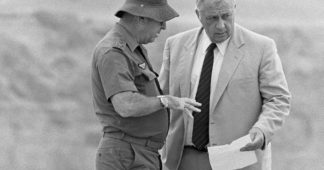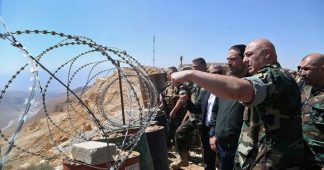A new book by an Israeli scholar dissects the extraordinary hold that the country’s military — and militaristic ways of thinking — have on Israeli society, and the ideological myths that keep the project afloat.
Review of An Army Like No Other: How the Israel Defense Forces Made a Nation,by Haim Bresheeth-Zabner (Verso, 2020).
By Belén Fernández
Aug. 24, 2020
The article, titled “Arithmetic of Pain,” posited the need for a “reassessment of the laws of war” in light of what Dershowitz determined to be an increasingly blurred distinction between combatants and civilians. Unfurling his concept of a “continuum of ‘civilianality,’” he explained:
“Near the most civilian end of this continuum are the pure innocents — babies, hostages and others completely uninvolved; at the more combatant end are civilians who willingly harbor terrorists, provide material resources and serve as human shields; in the middle are those who support the terrorists politically, or spiritually.”
The upshot: even purely innocent Lebanese babies were merely “near” the civilian-ish end of the continuum, while Israel was entirely exempt from the whole scheme because it is a “democracy.”
As it happens, however, it is Israel that is suffering from a dearth of “civilianality” — something that is made painfully clear in a new book, An Army Like No Other: How the Israel Defense Forces Made a Nation, by Haim Bresheeth-Zabner. Recalling Prussian minister Friedrich von Schrötter’s characterization of Prussia as “not a country with an army, but an army with a country,” Bresheeth-Zabner contends that this is “even more apt regarding the relationship between Israel and the IDF [Israeli Defense Forces].”
The IDF is the “center of Israeli existence,” an arrangement that he attributes primarily to David Ben-Gurion — Israel’s first prime minister — who determined that the very task of nation-forging was up to the army, which would transform the old Jew of the diaspora into the Israeli, using “nationalist alchemy to turn the base metal of the Ghetto Jew into the refined gold of the sabra soldier.”
The process was facilitated by Zionism’s embrace of the “mythical biblical Jew” and invention of an “unambiguous trait of Jewish militarism,” thanks to which two millennia of history were excised from the equation and the “new Jew became the imagined heir of genocidal Joshua, Bar Kochba, and Judas Maccabeus — a rogues gallery of militarized heroes who formed the foundation for the conquest of Palestine.”
And as the conquest of Palestine proceeds apace — with the army-with-a-state continuing its traditions of ethnic cleansing, land theft, and massacres to this day — brutal militarism remains the unifying national element. Alongside near-universal conscription is the near-universal approval among Israeli Jews for IDF-inflicted slaughter.
During Israel’s fifty-day onslaught in the Gaza Strip in 2014, for example — during which 2,251 Palestinians were killed, including 551 children (hi, Dershowitz) — approximately 95 percent of Jewish Israelis supported the bloody escapade. As the New York Times reported at the time, some even headed to a hilltop with plastic chairs, sofas, and popcorn to watch the bombs fall.
Bresheeth-Zabner writes that, in Israel, military service essentially “starts before birth,” and the “whole social structure is militarized” to the point that the IDF and associated apparatuses form a “politicocultural-economic military–industrial complex.” There’s also an academic side to the complex, with Israel’s seven universities and top research centers “collaborating with the IDF and armament production and training companies, creating a seamless security continuum.” So much for that popular argument that boycotting Israeli academic institutions constitutes “rank anti-Semitism.”
Invoking the old hammer-and-nail saying, Bresheeth-Zabner notes that the more a society habituates itself to the use of force, the more the world looks like a place where force is needed — a self-perpetuating vicious cycle that is of course only helped along when the world in question is ever eager to acquire Israeli weapons and murderous know-how that have been battle-tested on Israel’s captive Palestinians and other Arab populations.
And it’s not only the United States that throws gobs of money at Israel for its services on behalf of empire; Israel’s universities and research centers are the “recipients of more EU research funding than the great majority of EU countries,” as Israel busies itself finding new and improved ways to spread insecurity under the guise of security.
Bresheeth-Zabner identifies the late Shimon Peres as the “mind behind the military-industrial complex” in Israel, starting with his appointment by David Ben-Gurion in 1947 — the year before Israel’s “independence” from the people whose territory they stole — as the official responsible for personnel and arms procurement for the Haganah, the precursor to the IDF. Director general of the Israeli defense ministry in the 1950s before going on to serve as both president and prime minister, Peres was instrumental in Israel’s nuclearization and the general militarization of Israeli identity, and responsible for such events as the infamous 1996 massacre of 106 people sheltering at a United Nations compound in Qana, Lebanon.
And yet, in keeping with the magical inverse logic that governs mainstream discourse on Israel, Peres has been memorialized as a man of peace (with a Nobel Peace Prize to boot!) despite his contributions to making war the “existential condition of the nation.” And what do you know: Bresheeth-Zabner quotes none other than Peres on how, in Israel “nowadays, soldiers and civilians are exchangeable.” The old continuum of civilianality returns to mind.
Bresheeth-Zabner, himself a filmmaker and professorial research associate at the School of Oriental and African Studies, is the son of two Holocaust survivors from Poland. Born in 1946, stateless, in Rome, he emigrated with his family to Israel in 1948; his father refused to participate in weapons training on the boat and was arrested as a draft resistor upon arrival in Haifa. Though his parents were “hardly willing colonialists,” they were eventually normalized into the ranks of the colonial project, with military power evolving into a “symbol of survival” for them.
During his own reluctant service in the IDF during the 1967 war, Bresheeth-Zabner saw up close and personal the disparity between the professed ethics of Israeli militarism and reality, when a battalion commander asked the commanding officer what to do with two hundred prisoners of war: “He received no answer from the commanding officer, who snarled at us, ‘The idiot, doesn’t he know what to do with them? Do I have to tell him? No one answer this idiot, do you hear?!’”
An Army Like No Other is a real page-turner, combining history and analysis with firsthand tidbits from within the belly of the beast — like that time in the 1950s when Bresheeth-Zabner and other schoolchildren were “successfully harangued into donating their meager pennies” on behalf of Israel’s rearmament effort. He takes care to debunk Israel’s favorite myths, such as that the Nakba was the result of an attack by Arab states on Israel, remarking: “It is quite extraordinary to realize how pervasive such lies still are.”
In the acknowledgements section at the start of the book, Bresheeth-Zabner tells us how his computer was hacked while he was at work on the manuscript — and how he only discovered by chance that a malicious modification had been applied to the master file, with the footnotes extensively altered. Of course, when Zionists want so badly to discredit you, it can only indicate that you’re doing something right.
Not that Bresheeth-Zabner gets it exactly right, all of the time. For example, he claims that the Israeli occupation of Lebanon came to an “abrupt end in 2000, as tens of thousands of unarmed Lebanese organized by Hezbollah managed to expel the IDF” — a bizarre take on what was in fact a prolonged and extremely armed resistance movement in Lebanon.
In a number of cases, his use of the present perfect tense rather than some form of past tense is disconcerting — e.g., “King Hussein has agreed a week before the war to sign a defense treaty with Egypt and Syria,” or “A young demobilized officer, Moti Ashkenazi, has pitched a tent by the official residence of Golda Meir, demanding that the government admit responsibility and that it immediately sack Moshe Dayan.” Editors, it seems, should catch such things.
Minor quibbles aside, Bresheeth-Zabner deserves substantial praise for his pursuit of truth. In the section titled “Israel’s Wars,” he observes that Israel is the “only country in which Emergency Regulations have been in force for every minute of its existence” — a convenient state of affairs, no doubt, when emergencies are so exploitable.
And since Israelis are deeply divided on a variety of issues, the “‘security’ issue serves as the most effective social adhesive.” When in 2012 Israeli prime minister Benjamin Netanyahu was facing social protest and trailing in the polls, he decided to “give the public its favorite medicine, an attack on Gaza.” Matter resolved.
Now, as still–prime minister Netanyahu is once again facing protests and the “army like no other” is — surprise, surprise — once again bombing and otherwise making life hell in Gaza, Bresheeth-Zabner’s book is one hell of a valuable asset.











